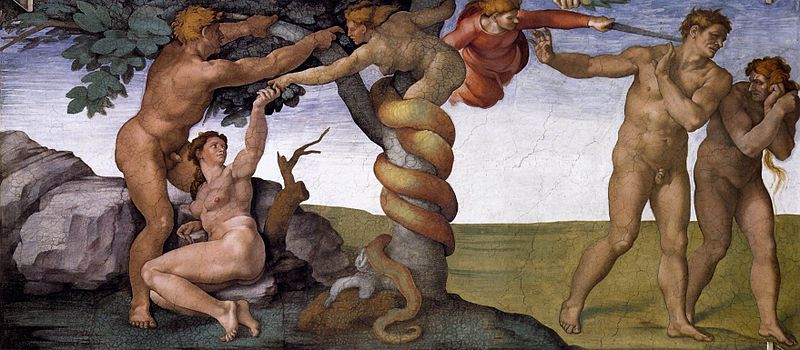Exodus 20:1-17
Psalm 19:8, 9, 10, 11
1 Corinthians 1:22-25
John 2:13-25
The thing that normally attracts people’s attention about the Gospel reading for this Sunday is the fact that Jesus appears to act in anger. He appears in the Temple courtyard and sees people buying and selling animals and moneychangers facilitating this commerce. He “makes a whip out of cords” and then drives everyone out of the area by force, apparently making quite a mess in the process. It is clearly the most physically aggressive act Jesus performs, and it appears in all four Gospels. So what are we to make of it?
I can only imagine what Jesus’ followers must have made of it at the time. Think about it: constructing a makeshift whip that could actually function as a weapon would not exactly be the work of a moment. I mean, can you picture the disciples looking over his shoulder as he’s wrapping the cords tighter and tighter, his jaw clenching from time to time? “So, uh Rabbi- what are you doing over there? Eh… say, what’s that for exactly?” And then all of a sudden the swinging and scattering commences. What in the world would they have made of that?
St. John goes to the trouble of mentioning that the disciples “recalled” and “remembered” the event in conjunction with Psalm 69 and Jesus’ resurrection on the third day, which apparently shed some light on the meaning of what Jesus did and said there. These remarks to my mind only confirm the suspicion that the disciples must have been bewildered and even somewhat alarmed by the outburst. The incident offers one of those rare windows of sorts into the role Jesus’ human emotion plays in the accomplishment of his earthly mission: zeal for your house, O God, will consume me.
When confronted by those whose economic order he has disrupted, Jesus refuses to provide the kind of signs that would justify his act. He refuses to give them any immediate demonstration that would validate their way of thinking. It is not that He did not perform signs during his visit to Jerusalem that year. In fact, he performed a sufficient number that “many began to believe in His name.” The next line, however, I find to be as heartbreaking as it is revealing: “Yet Jesus would not entrust himself to them, because he knew them all, and needed no one to testify about anyone; for he himself knew what was in everyone.”
Jesus would not entrust himself to them. What a terrifying phrase! The presumption is that some were interested in associating themselves with him, and he simply brushes them off. Why would he do that? Because he knew them all: he knew what was in their hearts. It is a very sad story in the end, reminiscent of the kind of sadness we are meant to feel at the rich young ruler turning away and walking back to his riches: Jesus cannot enter into relationship with them because the conditions for genuine friendship are lacking.
We cannot enter into friendship, we cannot truly entrust ourselves to anyone who simply desires what we have or what we can offer them. Yes, Aristotle would have called that a quasi-friendship, but even he acknowledges that it is not the real thing. All too often, though, that form of quasi-friendship—the friendship of utility—is exactly how we envision our relationship with God. How often do we worship God, pray to God, or even serve others on behalf of God for some purpose extrinsic to God himself? How often in our spiritual life do we find that the thing we really desire is not God himself but something God can give us? Or in the case of moral theologians, how often do we approach God as something about which we can possibly write an article (or blog post) rather than the first and highest object of our love?
The problem is nothing new: it is precisely the problem that the Decalogue is designed to deal with. We we often think of the “ten commandments” as giant rules that bind us and circumscribe our actions, but what they’re really about is the order of our loves. Likewise, even though most (including Aquinas) associate the Decalogue primarily with justice, it is also just as much about the demands of charity.
The first table of the Decalogue is about true fidelity, the conditions for genuine love of God and neighbor. The first commandment asks us: “what do you love the most?” That is, in a sense, the only question that matters in the end. To love God above all else is difficult, and the tendency to deceive oneself is strong. How do you name this reality; how do you fix it in thought so that it does not become simply a projection of yourself and your own interests? Enter the second commandment: do not take the Lord’s name in vain– do not allow that name to become something that fits into the status quo of your ordinary world.
If you’re serious about loving God above all else, you will also be attentive to how your actions bear out this love. For instance, the way you spend your time will reflect this love. Do you pray? Do you take time to “rest in God?” In addition, you will also love those whose relation to you bears the greatest resemblance to God’s relation to you, namely your parents. (I can only wonder what Aquinas was thinking when he wrote that with regard to parents, “it is not unreasonable if the obligation of gratitude has no limit” considering what his own parents did to him.) Beyond that particular relationship, you will then direct your love to what God loves, namely your neighbor. Commandments six through ten then set out the minimum requirements of this neighbor-love: do them no harm in deed, word or thought. Do not kill them, do not destroy their families, do not dispossess them. Do not trap them with lies, or direct your thoughts to appropriating what is theirs. All these requirements hang together, and all of them are necessary if you truly wish to love of God more than anything else. They are the conditions of trust, and not only amongst fellow neighbors, but most of all between human beings and God.
Here we encounter the real tragedy of the “cleansing of the Temple.” Jesus comes to the Temple to pray, to worship God, and to share with human beings the love that he himself is—and yet what he finds there is a swarming den of ulterior motives. He knew them all. He knew why they were there. He knew their true interests, and so he found it impossible to entrust himself to them.
So what about us? Where do we fall in this story? Is our piety a marketplace? It is only fitting that in this Lenten season, we should call out to the Lord to come and cleanse once again the Temples of the Holy Spirit which our own bodies were made to be at baptism, so that he might drive out from us the idols, self-deceptions and ulterior motives that keep us from entering into the friendship for which we were made.




